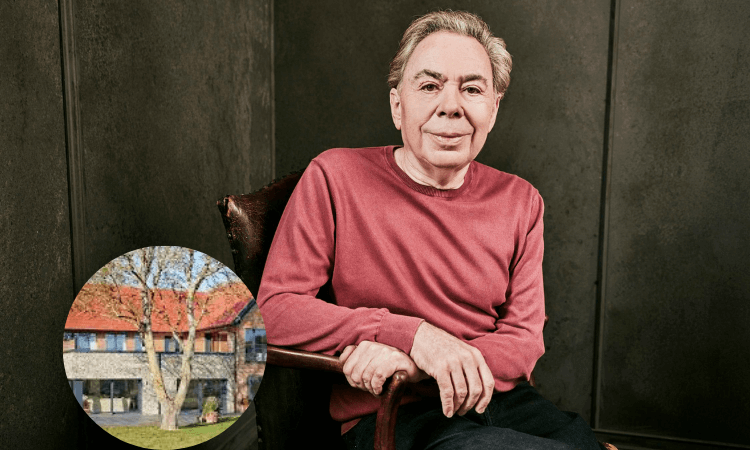Table of Contents
How much is Andrew Lloyd Webber Net Worth in 2025?
Andrew Lloyd Webber (born March 22, 1948) is a British composer and musical theatre impresario, widely regarded as one of the most influential figures in modern musical theatre. With a career spanning over five decades, he has composed some of the most successful and enduring musicals, including The Phantom of the Opera, Cats, Evita, Jesus Christ Superstar, and Joseph and the Amazing Technicolor Dreamcoat. His works are known for their sweeping melodies, grand orchestration, and a blend of rock, classical, and pop influences. Many of his productions have enjoyed record-breaking runs on Broadway and London’s West End, earning him multiple Tony Awards, Grammy Awards, and an Academy Award.
In addition to his success as a composer, Lloyd Webber has been a major force in theatre production, founding the Really Useful Group, a company dedicated to producing and managing theatrical ventures. He was knighted in 1992 and later elevated to the House of Lords as Baron Lloyd-Webber. His contributions to the arts have made him one of the wealthiest and most celebrated figures in the entertainment industry. Even in his later years, he continues to shape musical theatre, with new productions and revivals of his classics captivating audiences worldwide.
Name: Andrew Lloyd Webber (Baron Lloyd-Webber Kt)
Born: March 22, 1948 (Kensington, London, England)
Occupation: Composer, Musical Theatre Impresario
Notable Works: Joseph and the Amazing Technicolor Dreamcoat, Jesus Christ Superstar, Evita, Cats, The Phantom of the Opera, Sunset Boulevard, Starlight Express, School of Rock
Education: Westminster School, Magdalen College (Oxford, dropped out), Royal College of Music
Net Worth: $1.2 billion
DO NOT MISS: How much is Carole King Net Worth in 2025?
Andrew Lloyd Webber Net Worth
Andrew Lloyd Webber (also known as Baron Lloyd-Webber Kt) is a British composer, musical theatre impresario, and one of the most commercially successful figures in entertainment, with a net worth of $1.2 billion. Over his illustrious career spanning more than five decades, he has composed over 20 musicals, including Joseph and the Amazing Technicolor Dreamcoat (1968), Jesus Christ Superstar (1970), Evita (1976), Cats (1981), and The Phantom of the Opera (1986), which remains the longest-running Broadway show in history. Known for his sweeping orchestral compositions and ability to blend rock, pop, and classical influences, his work has left an indelible mark on musical theatre. Many of his productions have enjoyed record-breaking success in London’s West End and on Broadway, earning him multiple Tony Awards, Grammy Awards, an Academy Award, and even the rare EGOT status. He also owns the Really Useful Group, one of London’s largest theatre production and management companies, further solidifying his influence in the industry.
Beyond his contributions to theatre, Lloyd Webber has played an active role in the cultural and political landscape. He was knighted in 1992 and was made a life peer in 1997 by Queen Elizabeth II, serving as a Conservative member in the House of Lords until 2017. A strong advocate for arts education, he is the president of Chiswick’s Arts Educational Schools in London and established the Andrew Lloyd Webber Foundation in the early 1990s to support arts, culture, and heritage initiatives. His influence was recognized in 2008 when The Daily Telegraph ranked him the fifth most powerful person in British culture. Several of his musicals have been adapted into films, including Jesus Christ Superstar, The Phantom of the Opera, and Cats, while the 1996 adaptation of Evita, starring Madonna, won an Academy Award and three Golden Globes. In 2018, he chronicled his life and career in his memoir, Unmasked, offering a candid look at his creative journey and impact on musical theatre.

Early Life
Andrew Lloyd Webber was born on March 22, 1948, in Kensington, London, into a highly musical family. His mother, Jean Hermione Johnstone, was a pianist and violinist, while his father, William Lloyd Webber, was an esteemed organist and composer. His younger brother, Julian Lloyd Webber, went on to become an award-winning solo cellist. From an early age, Andrew displayed a remarkable talent for music, composing his first pieces at just nine years old. His Aunt Viola, an actress, played a pivotal role in nurturing his love for theatre by frequently taking him to watch stage performances. This early exposure to both music and drama laid the foundation for his future in musical theatre.
Lloyd Webber formally began his music education at the Eric Gilder School of Music in 1963, during which time he was already composing a musical about Genghis Khan titled Westonia! and experimenting with setting Old Possum’s Book of Practical Cats to music—an idea that would later evolve into Cats. He continued his studies at Westminster School as a Queen’s Scholar before enrolling at Magdalen College, Oxford. However, his passion for musical theatre soon took precedence, and in late 1965, he made the bold decision to leave Oxford to pursue his true calling at the Royal College of Music, setting the stage for his legendary career in composing and theatre production.
Meeting Tim Rice
At just 17 years old, Andrew Lloyd Webber received a letter from 21-year-old law student Tim Rice, who expressed interest in collaborating as a lyricist. The letter read: “Dearest Andrew, I’ve been told you’re looking for a ‘with it’ writer of lyrics for your songs, and as I’ve been writing pop songs for a while and particularly enjoy writing the lyrics, I wonder if you consider it worth your while meeting me.” This introduction sparked a lifelong creative partnership, and the two quickly began working on their first musical, The Likes of Us. Though it was completed in the 1960s, it remained unperformed for 40 years before finally being staged in 2005. In 1967, a family friend, Alan Doggett, commissioned Lloyd Webber and Rice to compose a piece for the Colet Court school choir. The result was Joseph and the Amazing Technicolor Dreamcoat, which was initially a short cantata but later expanded into a full-length stage production in 1972, marking the duo’s first major success.
Following Joseph, Lloyd Webber and Rice collaborated on Jesus Christ Superstar, which became a groundbreaking rock opera and solidified their reputation in musical theatre. However, when it came to adapting P.G. Wodehouse’s Jeeves and Wooster novels, Rice felt he couldn’t do justice to the material, prompting Lloyd Webber to team up with playwright and lyricist Alan Ayckbourn. Their musical, Jeeves, premiered in 1975 but struggled commercially, closing after just 38 performances. Despite its initial failure, Lloyd Webber revisited the project two decades later, reworking it into By Jeeves in 1996. This revised version enjoyed greater success and eventually made its way to Broadway in 2001, demonstrating Lloyd Webber’s persistence and ability to refine his artistic vision over time.
Success
Andrew Lloyd Webber and Tim Rice reunited for Evita, which was first released as a concept album in 1976 before making its stage debut. The album’s standout song, Don’t Cry for Me Argentina, became a massive hit, topping the UK Singles Chart. The musical premiered in London’s West End in 1978 and later moved to Broadway in 1979, where it starred Patti LuPone in the title role. Following Evita, Lloyd Webber collaborated with Don Black on Tell Me on a Sunday (1979) and then created Cats (1981), based on T.S. Eliot’s Old Possum’s Book of Practical Cats. Cats became a global sensation, running for 21 years in London, making it the longest-running musical in the West End at the time. It also held the record for Broadway’s longest-running show for 18 years until it was surpassed by Lloyd Webber’s own The Phantom of the Opera, which has been running since 1988 (with a brief suspension during the Covid-19 pandemic).
Continuing his streak of success, Lloyd Webber worked again with Black for Song and Dance (1982) and collaborated with Richard Stilgoe on Starlight Express (1984), a high-energy musical performed on roller skates. In 1986, he composed Requiem, a Grammy-winning Requiem Mass in honor of his late father. That same year, he and Rice were commissioned by Prince Edward to write Cricket for Queen Elizabeth II’s 60th birthday celebration; songs from the project later found their way into Aspects of Love (1989) and Sunset Boulevard (1993). The Phantom of the Opera premiered in the West End in 1986, becoming an enduring classic and the third longest-running musical in West End history. Lloyd Webber and Black also wrote Amigos Para Siempre — Friends for Life for the 1992 Barcelona Olympics before collaborating with Christopher Hampton on Sunset Boulevard, which won seven Tony Awards on Broadway. He then created Whistle Down the Wind (1998), which was later reworked into The Boys in the Photograph (2008), followed by The Beautiful Game (2000) and The Woman in White (2004).
In 2006, Lloyd Webber produced a revival of The Sound of Music, using the reality television show How Do You Solve a Problem Like Maria? to cast the lead role. He later released a sequel to The Phantom of the Opera titled Love Never Dies (2010) and produced a new staging of The Wizard of Oz (2011). In 2013, he collaborated with Black and Hampton on Stephen Ward the Musical before adapting the 2003 film School of Rock into a Broadway musical in 2015. His next major project was Cinderella, which was set to premiere in the West End in August 2020 but was postponed due to the Covid-19 pandemic. Throughout his career, Lloyd Webber has continually pushed the boundaries of musical theatre, cementing his legacy as one of the most prolific and influential composers of all time.
Personal Life
Andrew Lloyd Webber has been married three times and has five children. His first marriage was to Sarah Hugill in 1971, and the couple had two children, Imogen and Nicholas, before divorcing in 1983. That same year, he married soprano Sarah Brightman, who became famous for originating the role of Christine Daaé in The Phantom of the Opera. However, their marriage ended in 1990. In 1991, Lloyd Webber married Madeleine Gurdon, an equestrian and businesswoman, and they have three children together: Alastair, William, and Isabella. The couple resides in England and owns multiple properties, including the historic Sydmonton Court estate.
Beyond his career in musical theatre, Lloyd Webber is passionate about philanthropy and the arts. Through the Andrew Lloyd Webber Foundation, he has supported various initiatives in arts education and heritage conservation. He has also been open about his health struggles, including his battle with prostate cancer, which he successfully overcame. Additionally, he has been vocal about his political views, previously serving in the House of Lords as a Conservative peer before stepping down in 2017. Despite his immense success, Lloyd Webber remains deeply involved in the theatre world, frequently attending performances and working on new projects.
Conclusion
Andrew Lloyd Webber’s remarkable career has left an indelible mark on the world of musical theatre. With a legacy spanning over five decades, his groundbreaking compositions have shaped the industry, from Jesus Christ Superstar and Evita to Cats and The Phantom of the Opera, which remains one of the most successful musicals of all time. His contributions extend beyond music, as he has played a pivotal role in theatre production, philanthropy, and arts education through the Andrew Lloyd Webber Foundation.
A true visionary, Lloyd Webber’s influence continues to be felt in both the West End and Broadway, inspiring generations of performers, composers, and theatre enthusiasts. His dedication to storytelling through music has earned him numerous accolades, including an EGOT status, knighthood, and a life peerage. As he continues to create and support the arts, his legacy as one of the greatest composers of musical theatre remains firmly cemented in history.


